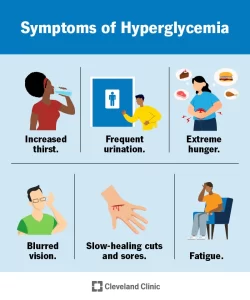
https://www.bhf.org.uk/what-we-do/news-from-the-bhf/news-archive/2021/july/high-blood-sugar-levels-reprogramme-stem-cells
Introduction
Hyperglycemia, commonly known as high blood sugar, is a condition that warrants attention in our increasingly health-conscious society. It is a prevalent concern, particularly among individuals with diabetes, but understanding its causes, symptoms and effective management strategies is crucial for everyone. In this article, we will delve into the intricacies of hyperglycemia and shed light on how it affects the body.
Several factors can contribute to high blood sugar in individuals with diabetes. These factors encompass aspects such as dietary choices and physical activity, health conditions, and medications unrelated to diabetes. Additionally, hyperglycemia can result from actions like missing prescribed doses or insufficient intake of insulin or other medications designed to reduce blood sugar levels.
What Blood Sugar Level Is Hyperglycemia

https://www.niddk.nih.gov/health-information/diabetes/overview/what-is-diabetes
Blood Sugar levels are typically measured in milligrams per deciliter (mg/dL) or milimoles per litre (m/mol/L). The definition of hyperglycemia can vary slightly depending on different medical guidelines. Generally, the following ranges are considered indicative of hyperglycemia:
- Fasting Blood Sugar:
Normal Range: Below 100 mg/dL ( 5.6 mmol/L)
Prediabetes (Impaired Fasting Glucose): 100-125 mg/dL (5.6-6.9 mmol/L)
Hyperglycemia (Diabetes): 126 mg/dL (7.0mmol/L) or higher.
2. Postprandial (After Eating) Blood Sugar:
Normal Range: Below 140 mg/dL (7.8 mmol/L)
Prediabetes: 140-199 mg/dL (7.8-11.0 mmol/L)
Hyperglycemia (Diabetes): 200 mg/dL (11.1 mmol/L) or higher
It’s important to note that these values may vary based on individual circumstances and the specific guidelines recommended by healthcare professional circumstances and the specific guidelines recommended by healthcare professionals or organizations. Diagnosis and management of hyperglycemia should be done in consultations. Diagnosis and management of hyperglycemia should be done in consultation with a healthcare provider who can interpret the results in the context of the individual’s overall health and medical history. Regular monitoring and proper management are essential for individuals with diabetes to maintain blood sugar levels within the target range and prevent complications.
Defining Hyperglycemia:
Hyperglycemia occurs when there is an abnormally high level of glucose in the blood. Glucose, a form of sugar is the body’s primary energy source, but when its levels become elevated, it can lead to a cascade of health issues. This condition arises when the body either produces too little insulin ( a hormone responsible for regulating blood sugar) or when the body is unable to use insulin effectively, a condition known as insulin resistance.
Typically associated with diabetes, hyperglycemia is a recurring occurrence for individuals with this condition. When left untreated over extended periods, hyperglycemia has the potential to inflict damage on nerves, blood vessels, tissues, and organs within the body. In severe cases, hyperglycemia can escalate into a sudden and severe life-threatening complication known as diabetes-related ketoacidosis (DKA), particularly in individuals with diabetes who use insulin or those with undiagnosed Type 1 diabetes. Immediate medical attention is essential in such cases.
What Are Causes Of Hyperglycemia
Hyperglycemia primarily results from an insulin deficiency, and the deficiency can be attributed to insulin resistance or issues with the pancreas, the organ responsible for insulin production. Insufficient insulin response can lead to hyperglycemia. Insulin resistance, also known as impaired insulin sensitivity, occurs when cells in the muscles, fat and liver do not respond appropriately to insulin. When this resistance is present, the body requires increasing amounts of insulin to regulate blood sugar. In cases where the body cannot produce enough insulin or insufficient insulin is administered, hyperglycemia ensues.
Common Cause Of Insulin Resistance
Obesity: It is a primary cause of insulin resistance.
Physical inactivity
A diet of highly processed, high carbohydrate foods and saturated foods.
Some medications such as corticosteroids and HIV may cause temporary or long-term insulin resistance.
Some hormones can lead to insulin resistance:
Cushing Syndrome (Excess Cortisol)
Acromegaly ( Excess growth hormone)
Pregnancy: During pregnancy, the placenta releases hormones that cause insulin resistance.
What Are Symptoms Of Hyperglycemia

https://my.clevelandclinic.org/health/diseases/9815-hyperglycemia-high-blood-sugar
Increased Thirst & Urination: Elevated blood sugar levels can lead to increased thirst and frequent urination.
Fatigue: Cells deprived of adequate glucose can cause feelings of tiredness and weakness.
Blurred Vision: High blood sugar can affect the lens of the eye, leading to temporary vision problems.
Slow Wound Healing: Hyperglycemia can impair the body’s ability to heal wounds efficiently.
Complications Associated With Hyperglycemia:
Cardiovascular Issues: Prolonged high blood sugar levels can contribute to heart disease and other cardiovascular complications.
Nerve Damage: Neuropathy, a condition characterized by nerve damage, is a potential complication of uncontrolled hyperglycemia.
Kidney problems: Hyperglycemia can overwork the kidneys, leading to kidney disease over time.
Conclusion:
Hyperglycemia is a condition that demands awareness, proactive management, and lifestyle adjustment. Whether you are living with diabetes or simply aiming for optimal health, understanding the dynamics of blood sugar and taking preventative measures can pave the way for a healthier and more balanced life. Regular check-ups, a mindful diet, and an active lifestyle are powerful tools in the ongoing battle against hyperglycemia and its potential complications.
References:
Disclaimer: All the content of this article is for information purposes only.

 Hobbies: The Power Of In Refreshing Mood
Hobbies: The Power Of In Refreshing Mood Millets : Adapt Millet In Your Life Style
Millets : Adapt Millet In Your Life Style Diabetes Supplements: A Comprehensive Guide
Diabetes Supplements: A Comprehensive Guide


